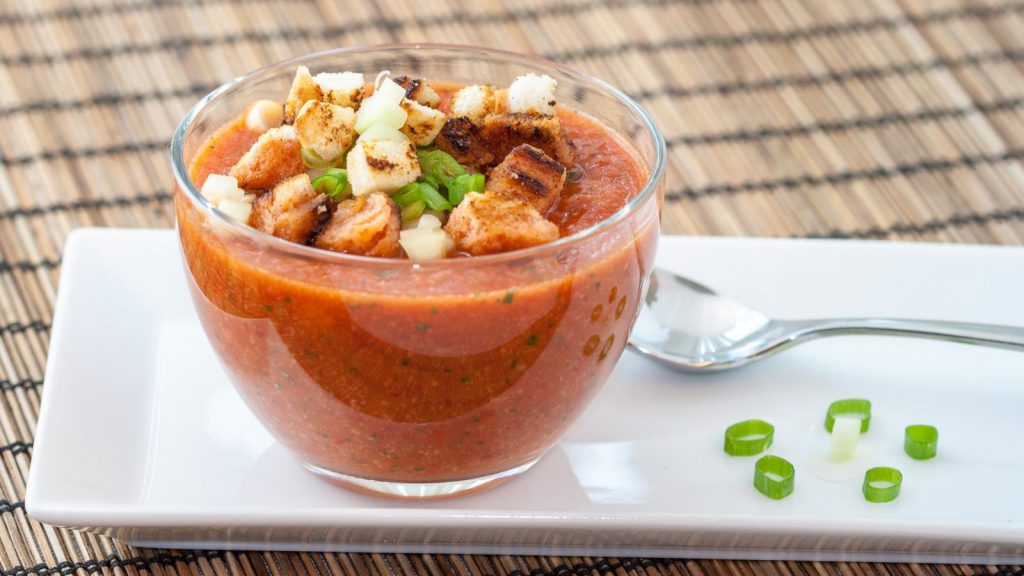Gazpacho Andaluz
Gazpacho Andaluz is a healthy Spanish soup that embodies the vibrant flavors of Spain. This summer gazpacho recipe is made with simple, fresh ingredients such as tomatoes, cucumbers, peppers, and onions. The key to an excellent gazpacho recipe is marinating the vegetables and blending them into a smooth, rich soup. You can add shrimp for an extra protein boost, or enjoy it as a chilled soup on its own. This dish is also perfect for shrimp gazpacho enthusiasts, as the shrimp adds both texture and flavor to the mix.The Gazpacho Andaluz should be served cold, garnished with croutons or additional fresh vegetables. Whether you're preparing a summer gazpacho for a family gathering or just craving a tomato cucumber pepper soup, this dish is a great way to embrace the flavors of Spain.
Servings: 4
Calories: 175kcal
Ingredients
- 2 stalks celery
- 1 medium red onion
- 2 medium red peppers
- 2 medium cucumbers, peeled
- 1 small bunch of cilantro, chopped
- 6 cloves garlic, minced
- 28 fl.oz tomatoes, can
- 5 ounces tomato paste
- 0.25 cup breadcrumbs
- 0.5 cup red wine vinegar
- 1 pinch cayenne pepper
- White pepper and salt, to taste
- 0.5 cup olive oil + 2 tablespoon
- 1 cup water
- 4 green onions, chopped
- 1 cup tomato juice
- 4 slices of white sandwich bread
- 0.25 pound cooked small shrimp, optional
Instructions
Prepare the Gazpacho vegetables:
- Chop celery, red onion, red peppers (remove seeds), cucumbers (peel and seed), cilantro, garlic, and tomatoes (peel if desired).
Prepare the Gazpacho garnish:
- Cut the bread into cubes and sauté in 2 tbsp olive oil until golden and crispy. Season with salt and set aside on paper towels to absorb excess oil. Dice the remaining cucumber and chop the green onions for garnish.
Make the Gazpacho :
- In a large bowl, combine all vegetables, tomato paste, breadcrumbs, red wine vinegar, cayenne pepper, and water. Add ½ cup olive oil, tomato juice, and season with salt and white pepper. Let the mixture marinate in the fridge for at least 2 hours.
Blend and Adjust Seasoning:
- Process the mixture in a food processor until finely chopped. Return it to the bowl and taste; adjust seasoning with salt, pepper, and cayenne as needed.
Serve:
- Serve the chilled gazpacho with optional shrimp and garnish with croutons and chopped green onions.
Video
Notes
Gazpacho descends from an ancient Andalusian liquid concoction based on a combination of stale bread, garlic, olive oil, salt, and vinegar. Tomato was added to the recipe after it was brought to Europe after the Columbian Exchange, which began in 1492.
Cooking Tips for Gazpacho Andaluz:
- Quality of Ingredients:
Fresh tomatoes and high-quality extra virgin olive oil can make a significant difference in the flavor of your gazpacho. The fresher the ingredients, the richer the taste. - Textural Options:
For a smoother texture, blend the gazpacho longer or strain it after blending. If you prefer a chunkier texture, pulse it briefly in the blender to retain some of the vegetables’ integrity. - Flavor Balance:
Adjust the level of acidity with vinegar and tomato juice to suit your taste. You can also add a dash of lemon juice if you like a slightly citrusy zing. - Chilling the Soup:
While marinating the ingredients in the fridge is key for flavor, ensure you chill the soup for at least 2 hours before serving to allow the flavors to meld. - Vegan-Friendly Option:
To make this recipe vegan-friendly, omit the shrimp and use a plant-based bread for croutons.
Enjoy your gazpacho, packed with nutrients and perfect for any summer meal!
Elevate Your Culinary Skills with Our Courses!
Ready to enhance your cooking? Our online courses cover everything from basics to advanced techniques, perfect for any skill level. Learn baking, meat prep, international dishes, and more— all from home!
🌐 Explore Our Full Course Catalog and Start Your Culinary Journey
Also, check out our YouTube Channel for recipes, tips, and expert cooking advice to inspire your next meal!
🔴 Subscribe Now for fresh recipes and culinary tips!
